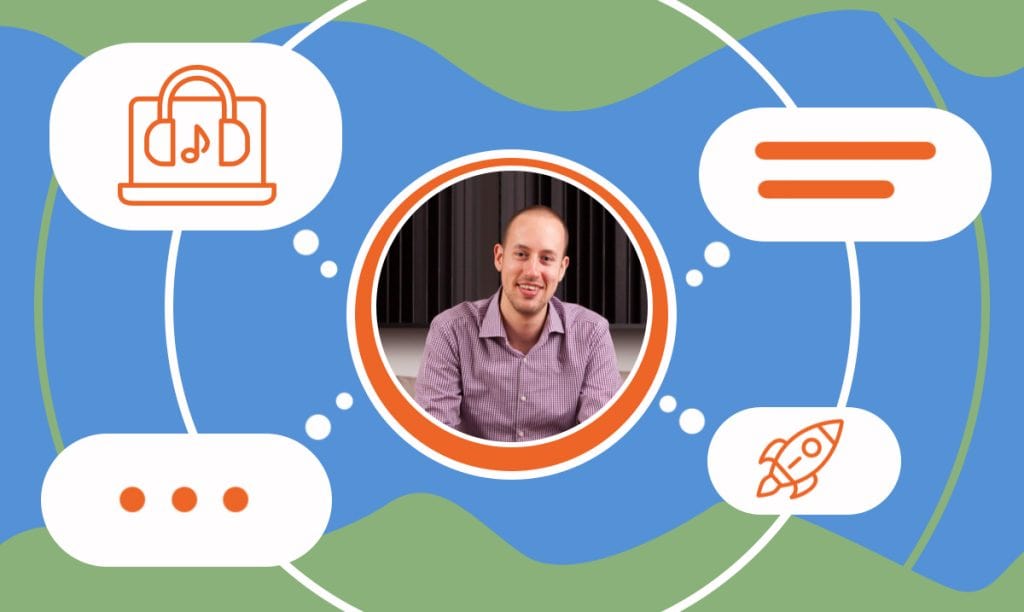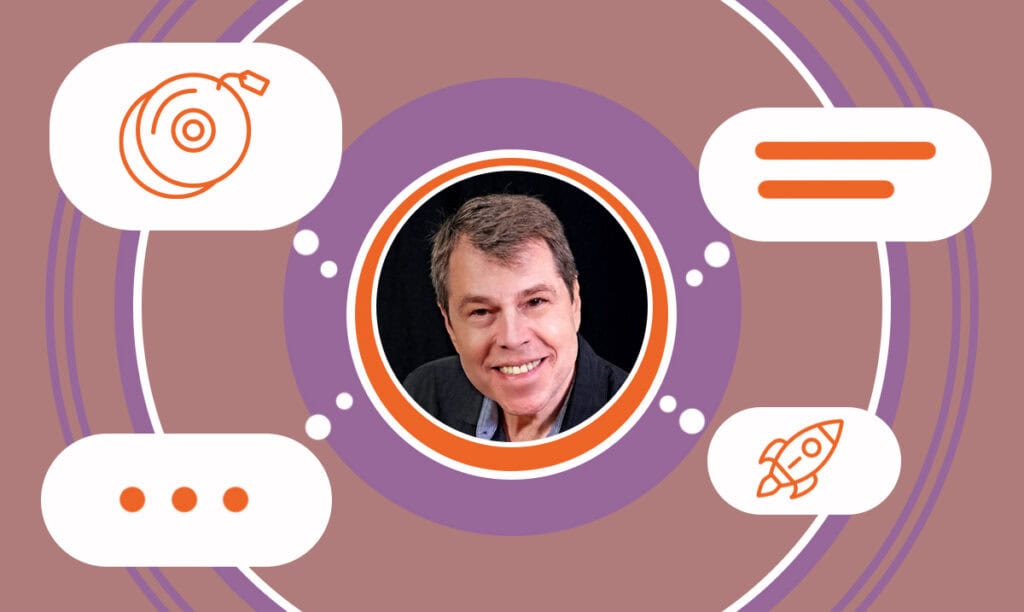In this exclusive interview, we explore the journey and evolution of Sound Lounge through the perspectives of its key leaders. Dana Villarreal,execu ...
How Alex Sterling Created NYC’s Go-To Studio for Top Sound
Written by: Esther Strauss
Esther is a business strategist with over 20 years of experience as an entrepreneur, executive, educator, and management advisor.
Published on September 25, 2024

Alex Sterling, the founder of Precision Sound Studios, has built an impressive career at the intersection of creativity and technical expertise. His passion for music production began as a teenager when he was introduced to computer-based music sequencing, which led him to pursue formal training in audio engineering.
Inspired by advice to “hang your shingle” and put himself out there, Alex embraced entrepreneurship early on, working as a freelance audio engineer around New York City. Over time, he built a solid client base and established Precision Sound Studios, a high-performance recording space known for delivering exceptional sound quality and client experience.
Through years of dedication and innovation, Alex continues to push boundaries in the music industry. Read the full interview below.
The Inspiration Behind Precision Sound Studios
SBS – What inspired you to start Precision Sound Studios?
Alex – I was introduced to computer music sequencing and programming with MIDI (Musical Instrument Digital Interface) software as a teenager. Making music using computers became a major creative passion for me. This led me to pursue more technical training in audio engineering and music production at The Institute of Audio Research (IAR) and then NYU.
At IAR, the career services person said something to the class that I found very impactful:
“If you want to be an engineer, engineer something. If you want to be a producer, produce something. Hang your shingle and put yourself in business.”
This inspired me to put myself out there and begin providing services for hire. I immediately became an entrepreneur rather than trying to get a “regular” job. As it happened, there are very few regular jobs available in music anyway, so this was a good long-term approach.
I became a freelance audio engineer and worked around New York City doing any sound-related gigs I could find. I was fortunate to get some early opportunities and work experience under several mentors who challenged me to rise to the occasion on some complex and high-pressure jobs. There was a lot of core skill-building in those early years, and I am really thankful for these experiences, which gave me the confidence to keep going.
After several years of working across the field doing live sound, concert recording, acoustic treatment, technical wiring, session assisting, tape library management, and general studio engineering, I was able to assemble enough of a client base to centralize my work into a more formal recording studio space. This space evolved over the years into the current business.
Early Challenges in Building a Studio
SBS – What were the biggest challenges you faced in the early stages of your business?
Alex – Music and sound is a relationship business, and it took years to build those connections. Connecting with new people, finding projects, developing consistent work, and getting my name out was the challenge.
The first years of my career were pre-social media/content marketing, and in-person relationship-building was the only option. You had to actually show up and do something useful for people to get to know you. I was fortunate to eventually connect with a few early anchor clients that kept me busy and helped grow my relationships in the field more broadly.
Handling Competition in the NYC Music Scene
SBS – How do you handle competition in a city with so many music studios?
Alex – I don’t consider many of the studios in NY to be meaningful competition because what we offer is so far beyond what most studios provide in terms of client comfort, professional experience, and equipment. There are only a handful of studios in NY that operate at our level, and we all are friends.
Audio engineers and producers are artists in their own right, and we provide unique aesthetic contributions to a project. People choose us for our taste and artistic sensibility.
While the recorded music side of the business has experienced major shifts in budgets and the revenue model for recording artists is in turmoil, there has been growth in production in other areas, like YouTube content, film and TV streaming, games, and podcasts. This has created more demand and opportunities.
Key Equipment and Technology at Precision Sound
SBS – What are the key pieces of equipment and technology you use in your studio?
Alex – Audio production involves the art of critical listening and applying technical operations in response to the sonic profile of the content. Audio engineers use their senses to respond analytically and emotionally to the content and make artistic decisions based on these inputs. In order to perceive the finer nuance and character of recordings, it’s beneficial to work in a carefully constructed listening environment that gives maximum sonic clarity and information to the listener.
Precision Sound has lots of great musical instruments, microphones, equipment, and software, but the essential tool is the control room (and its acoustics) itself, which was built around very high-performance speakers from one of the leaders in speaker design, ATC, in the UK. The ATC speakers are built into the wall and mounted using a proprietary vibration control assembly that was custom developed for the studio.
The sound quality is really special, and we can shape sounds with great confidence that the work will translate to other systems when released.
Client Attraction and Retention Strategies
SBS – What strategies have you used to attract and retain clients?
Alex – Do they know you exist? Do you have a website and social media presence for the client to verify that you are who you say you are? Do you provide something of value to your customer? Have you communicated in a clear manner what you can do for the client? Does the client have the information they need to contact you? Are you ready, willing, and able to serve the client when they contact you? It’s pretty basic at the end of the day.
A strong focus on professionalism and service is a major factor in client retention. This is as simple as writing clear and well-formatted emails, responding to client communications in a timely manner, being organized about quoting, invoicing, and scheduling, and maintaining professional and friendly communication before, during, and after a session.
Once people experience the ease of working with us, they usually come back for future work. Our job is to help people with their projects, everything we do is in service to the needs of the client. People enjoy working with organized and friendly people. This is who we are.
Lessons on Managing a Creative Business
SBS – Can you share some key lessons you’ve learned about managing a creative business?
Alex – Creative work requires earning the trust of the client. You do this by serving their unique needs with efficiency and reliable attention to detail. They need to see you and your business as the solution to their needs, not an obstacle.
It’s imperative to find ways to manage project complexity and stay organized. Invest in your physical and technical infrastructure (as applicable) to give people a stand out experience and stay several steps ahead of everyone else in the room when it comes to what is needed at any moment. Be planful and try to anticipate what people need so that it can be ready for them when they ask.
Maintain an attitude of dutiful service and caring for your clients. The job is to help them. Deliver quality no matter what.
Ensuring High-Quality Sound and Production
SBS – How do you ensure high-quality sound and production standards?
Alex – This starts with myself and my team all having detail-oriented personalities. We are highly invested in the technical and artistic success of a project by default. This is why we do this and we love the process. Having pride and creative satisfaction in the outcome is the basis for a quality production.
Running an efficient and capable recording studio is complex. Understanding and adapting to client needs and workflows demands extreme creative adaptability every day. Engineers need to maintain a deep well of creative and technical knowledge, manage the creative flow of the session, navigate interpersonal dynamics, and find a way to both lead the process and follow the artist’s direction at the same time. These skills take years to develop and a lifetime of practice to refine.
Audio follows an apprenticeship model where people move up in responsibility as their skills and experience are demonstrated. I only work with people who care deeply about delivering quality work and are qualified in the role they have.
Every day, I try to evaluate what we did and what we could do better next time. Learning never stops.
Staying Updated with Music Industry Trends
SBS – How do you stay updated with the latest trends and technologies in the music industry?
Alex – It’s a question of degree. Not everything new is better. I like to experiment with new tools and there is a bit of general knowledge acquisition from peers and the larger audio community, YouTube, etc. Practicing the skills is important to stay fresh.
Learning new techniques and approaches is helpful to broaden your creative range and find more efficiency in doing the work, but ultimately, people are most interested in what they feel when they work with you and how their project feels to them when they listen to it.
This has nothing to do with being on top of new AI tools or the latest music style; it has much more to do with the depth of empathy and social intelligence you can bring to your communication with your collaborators.
How well you can communicate with and serve the creative needs of your clients is more important than whether you are on top of the latest technical advancements. This is coming from a person who loves the tech side of things, by the way!
Advice for Starting a Music Studio
SBS – What advice would you give to someone looking to start their own music studio?
Alex – A recording studio is a hospitality business disguised as a media production space. The goal is to make people feel comfortable in your space and with you. Pay attention to the details, be thorough in your studio design process, and try to build flexible and scalable infrastructure so you can handle whatever comes in the door. Be considerate of the human needs in your space. Develop an attitude of collaboration and caring for the people you work with. Take the professional responsibility seriously and strive to do the best job you can with whatever means you have.
Balancing Creativity and Business in Studio Management
SBS – How do you balance the creative and business aspects of running a studio?
Alex – Technology has made running a business much easier in the modern era. There are many great software tools and services to handle invoicing, time tracking, bookkeeping, etc. I enjoy dealmaking, and negotiating bookings can be creative at times, but mostly, it’s just another set of tasks to get through. The real passion is in creative work.
Most of the business challenges I face relate to managing the long hours and the sedentary nature of work in a studio. It can be tough to balance the time involved doing the work with the other needs of life. It’s easy to overbook yourself, and this can take a toll on your energy and, at times, hamper your creativity if you’re feeling burnt out. It’s important to be realistic with how much work to take on at any given time and make sure to find sources of inspiration outside the studio as well.
Future Goals
SBS – What are your future goals for Precision Sound Studios?
Alex – There is always more to learn about how to operate better and to grow and expand our skills as engineers and production professionals. Striving for excellence in all things is an ongoing process.
The studio’s mission is to help clients achieve their creative goals in a comfortable and efficient environment with an impeccable professional experience. We will continue to build upon the success we’ve had and look for ways to further improve every aspect of the studio, whether it is in our equipment, operating efficiency, client comfort and hospitality, or technical capacities, etc.
We are currently making a substantial investment in Dolby Atmos production tools to help our clients to access this innovative format and be able to take advantage of the growing interest in immersive content. This is the next major step for us in broadening our capabilities.
I also founded a second business in audio called Space Lab Systems which manufactures high end speaker stands and other products for the pro audio industry. Precision Sound is the proving ground where these designs are developed and tested. I anticipate more and more inventions coming out of our experience with high-level engineering and music production.
Creating a Productive and Creative Studio Environment
SBS – How do you foster a creative and productive environment for your clients and team members?
Alex – A recording studio is an innately creative environment. It’s a place that people come to with the intention to create artistic work. Clients are usually very excited to be here and light up when they hear their project coming alive.
People want to be in uplifting and comfortable spaces wherever possible. Precision Sound was designed with people’s comfort in mind. When I was envisioning the space, I took care to make design choices that would positively influence how people feel when they are here.
This was accomplished by carefully selecting the interior finishes, lighting design and controls, engineering a silent HVAC/air quality management, and selecting comfortable furniture and decor, including a living green wall.
One of my favorite parts of the day is when a new client arrives and they immediately start looking around and complimenting the space. Someone once told me that the studio was “expanding to the mind” and that was confirmation that the architecture was doing its job.
A creatively inspiring space is nothing without the technical infrastructure to match. The studio is not just a pretty face, it’s also a technical environment full of quality equipment, instruments, microphones, and software. All of these tools are set up for quick access and this enables them to be deployed usefully without holding up the creative flow. We can get great sounds quickly and this helps us to be productive and adaptable as the needs of a session evolve.
Subscribe to Our Newsletter
and gain insider access to cutting-edge business insights and trends.
Featured Resources

How Sound Lounge Became a Pioneer in Audio Post-Production
Published on September 10, 2024
Read Now

How Shira Yevin Is Empowering Women in Music with Gritty In Pink
Published on June 21, 2024
In this interview, we delve into the inspiring journey of Shira Yevin, founder and CEO of Gritty In Pink and the INPINK marketplace and frontwomanof ...
Read Now

Building a Top NYC Recording Studio with Michael Kevin Walsh
Published on June 20, 2024
Michael Kevin Walsh is the owner of The Smooth Spot, a premier recording studio located in midtown Manhattan. Known for its high-quality vocalrecord ...
Read Now
Comments